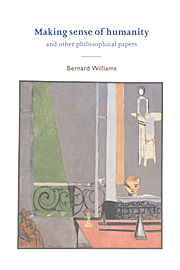Book contents
- Frontmatter
- Contents
- Preface
- I Action, freedom, responsibility
- 1 How free does the will need to be?
- 2 Voluntary acts and responsible agents
- 3 Internal reasons and the obscurity of blame
- 4 Moral incapacity
- 5 Acts and omissions, doing and not doing
- 6 Nietzsche's minimalist moral psychology
- II Philosophy, evolution, and the human sciences
- III Ethics
- Index
6 - Nietzsche's minimalist moral psychology
Published online by Cambridge University Press: 28 January 2010
- Frontmatter
- Contents
- Preface
- I Action, freedom, responsibility
- 1 How free does the will need to be?
- 2 Voluntary acts and responsible agents
- 3 Internal reasons and the obscurity of blame
- 4 Moral incapacity
- 5 Acts and omissions, doing and not doing
- 6 Nietzsche's minimalist moral psychology
- II Philosophy, evolution, and the human sciences
- III Ethics
- Index
Summary
Nietzsche, Wittgenstein and the extraction of theory
Nietzsche is not a source of philosophical theories. At some level the point is obvious, but it may be less obvious how deep it goes. In this respect, there is a contrast with Wittgenstein. Wittgenstein said repeatedly, and not only in his later work, that he was not to be read as offering philosophical theory, because there could be no such thing as philosophical theory. But his work was less well prepared than Nietzsche's was to sustain that position posthumously. There is more than one reason for this. Wittgenstein thought that his work demanded not only the end of philosophical theory but the end of philosophy – something associated, for him, with the end of his demands on himself to do philosophy. That association, of the end of philosophical theory with the end of philosophy, does not deny the idea that if there is to be philosophy, it will take the form of theory; indeed, it readily reinforces that idea. Moreover, the topics on which Wittgenstein wanted there to be no more philosophy – the topics, for him, of philosophy – were traditional topics of academic philosophy. It is not surprising that those who continue theoretical work on those topics still look for elements in Wittgenstein's work itself from which to construct it.
- Type
- Chapter
- Information
- Making Sense of HumanityAnd Other Philosophical Papers 1982–1993, pp. 65 - 76Publisher: Cambridge University PressPrint publication year: 1995
- 21
- Cited by



